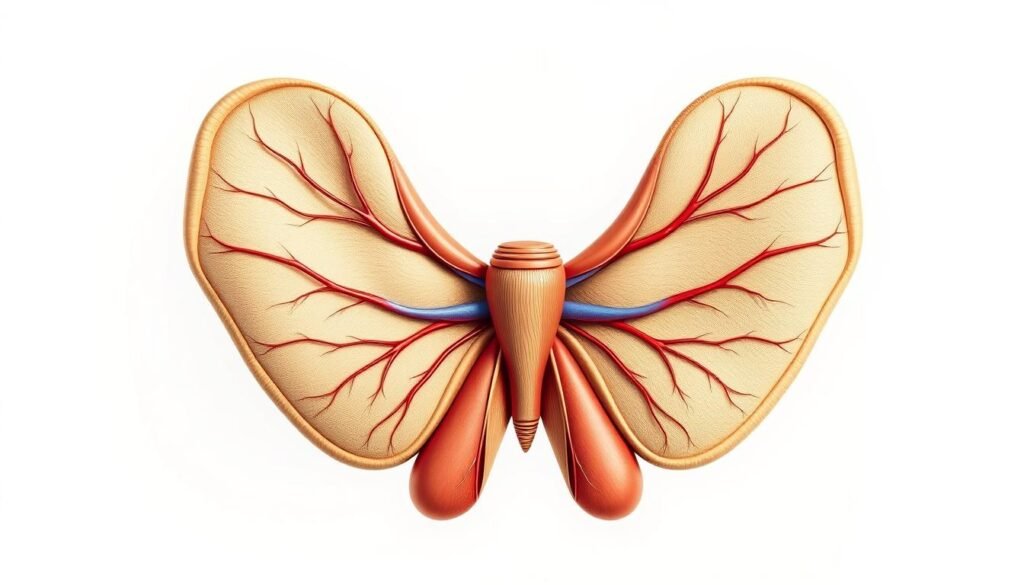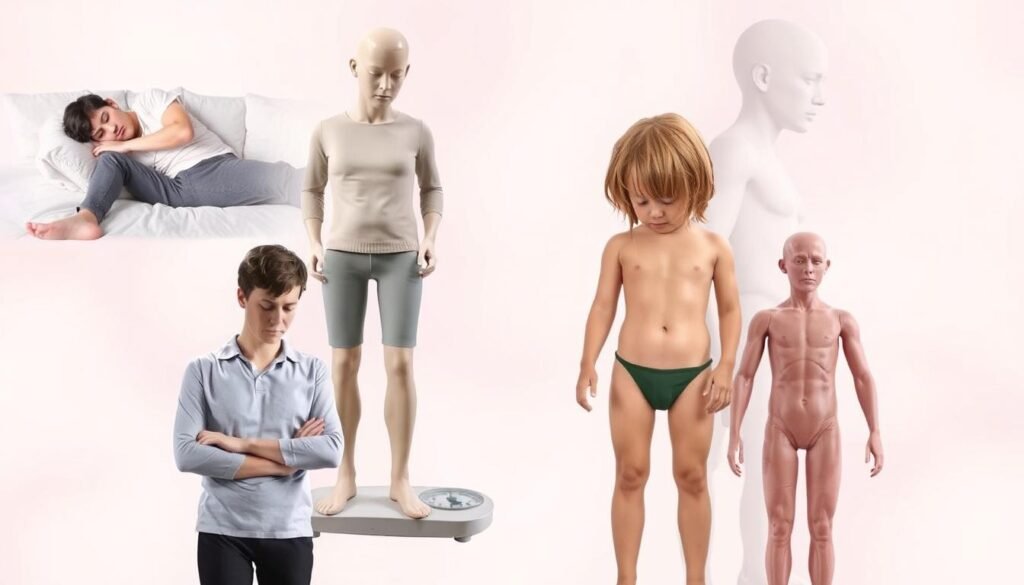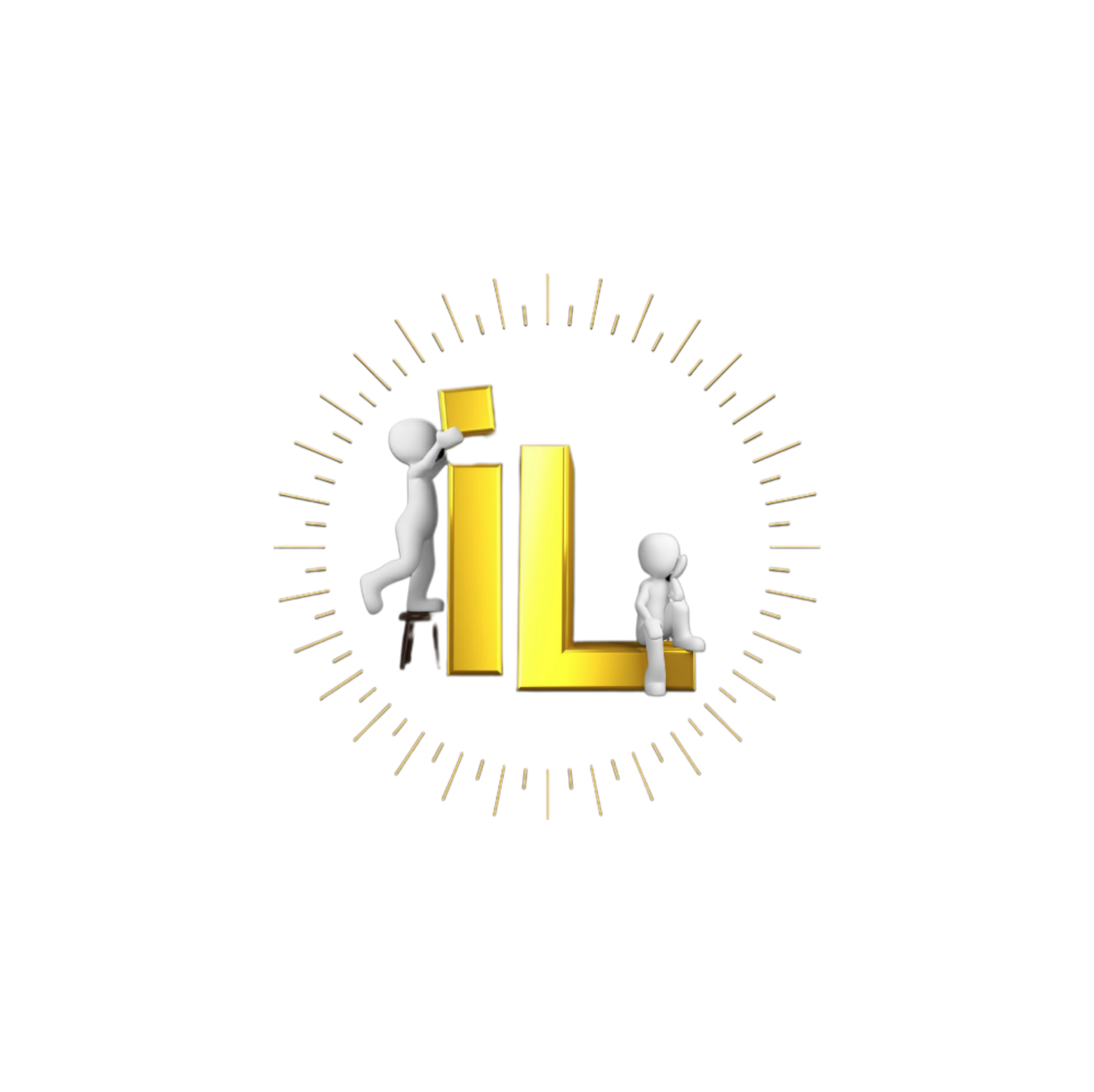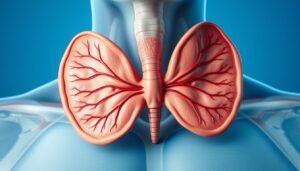Did you know a small gland in your neck controls your metabolism and energy? The thyroid gland is key to our health, making hormones that help us grow. Yet, many don’t know about its role, with up to 60 percent of people unaware of thyroid diseases.
Understanding the thyroid gland is vital. It affects our daily lives. Surveys show more adults in the U.S. are getting treated for thyroid issues. Women, older adults, and non-Hispanic whites are most affected.

Key Takeaways
- The thyroid gland produces thyroid hormones that regulate metabolism, growth, and development.
- Up to 60 percent of people with thyroid disease are unaware of their condition.
- Thyroid disorders mainly occur in women, but can also affect men, teenagers, children, and babies.
- Hypothyroidism is the most common thyroid disorder, while hyperthyroidism and thyroid cancer are also possible.
- Thyroid function can be affected by iodine deficiency, selenium deficiency, and zinc deficiency.
- Blood tests are commonly used to diagnose thyroid disorders, and most thyroid disorders are treated with daily medication.
- Understanding thyroid gland function and thyroid hormones is essential for maintaining overall health.
Understanding the Thyroid Gland Location and Structure
The thyroid gland sits in the front of the lower neck, below the Adam’s apple. Its thyroid gland location is key to producing hormones that control our body’s functions. It has two lobes joined by an isthmus, all wrapped in a fibrous capsule. This capsule is a vital part of its thyroid gland structure.
The thyroid anatomy is intricate. It gets blood from the superior and inferior thyroid arteries. Some people have an extra artery called the thyroid ima artery. This gland’s blood supply is incredibly high, six times that of the kidney and three to four times the brain’s.
- Between 28% to 55% of individuals may have a pyramidal lobe extending superiorly from the isthmus of the thyroid gland.
- The prevalence of ectopic thyroid tissue is estimated to be between 1 per 100,000 and 1 per 300,000 individuals.
- 10% of the population may have an additional artery known as the thyroid ima artery, with variable origins.
Anatomical Position and Size
The thyroid gland’s position and size are vital for its function. Knowing its thyroid gland location and thyroid gland structure helps in diagnosing and treating thyroid issues.
The Essential Role of Thyroid Hormones
Thyroid hormones are key for our body’s metabolism, growth, and development. The thyroid gland makes two main hormones: triiodothyronine (T3) and thyroxine (T4). These hormones are sent into the blood and reach different parts of our body. They help control how fast our body burns energy and how warm we stay.
Having a healthy thyroid gland is vital for our health. Hormone regulation is important because not having the right balance can cause problems. T3 and T4 help us manage our weight, energy, body temperature, and how fast we metabolize.
Some important facts about thyroid hormones include:
- T3 and T4 are made by the thyroid gland and controlled by the pituitary gland.
- These hormones affect how our body grows, develops, and uses energy.
- When thyroid hormones are out of balance, it can cause health problems like hypothyroidism or hyperthyroidism.
Knowing how thyroid hormones work and their role in hormone regulation is key to staying healthy. By watching for signs of thyroid issues and getting help when needed, we can keep our thyroid gland working right. This leads to a healthier and more balanced life.
| Hormone | Function |
|---|---|
| T3 (Triiodothyronine) | Regulates metabolism, energy production, and growth |
| T4 (Thyroxine) | Converted to T3, influences metabolism, heart function, and brain development |
How Your Thyroid Gland Functions Daily
The thyroid gland is key to many body functions, like metabolic regulation, growth, and development. It works every day to keep us healthy. It makes hormones based on signals from the hypothalamic-pituitary-thyroid axis.
This gland is vital for hormone production. It makes T3 and T4 hormones. These hormones help control metabolic regulation and energy use in our bodies.
Hormone Production Process
The thyroid gland makes three important hormones: Triiodothyronine (T3), Tetraiodothyronine (T4), and Calcitonin. These hormones help with thyroid function and metabolic regulation. The hypothalamic-pituitary-thyroid axis controls how much hormone is made.
Regulatory Mechanisms
The thyroid gland works with the hypothalamus, pituitary gland, and itself to regulate hormone production. This ensures the right amount of hormones for metabolic regulation and body function. The thyroid’s role in energy and heat production is huge.
Common Signs of Thyroid Dysfunction
Thyroid symptoms can vary a lot. It’s key to know the common signs of thyroid problems. Thyroid dysfunction can show up as hypothyroidism or hyperthyroidism. Each has its own set of symptoms.
Hypothyroidism brings fatigue, weight gain, and feeling cold. On the other hand, hyperthyroidism causes weight loss, feeling hot, and a faster heart rate.
Some common signs of thyroid problems include:
- Fatigue and weakness
- Weight gain or loss
- Changes in appetite
- Mood disturbances, such as anxiety or depression
It’s vital to spot these signs early. This way, you can get diagnosed and treated quickly.

Ignoring thyroid issues can lead to serious problems. These include goiter, heart issues, and nerve damage. So, if you notice any symptoms, see a doctor right away.
By knowing the signs of thyroid problems, you can help keep your thyroid healthy. This is important for your overall well-being.
| Thyroid Dysfunction Type | Symptoms |
|---|---|
| Hypothyroidism | Fatigue, weight gain, cold intolerance, dry skin |
| Hyperthyroidism | Weight loss, heat intolerance, increased heart rate, nervousness |
Understanding Thyroid Disorders and Diseases
Thyroid disorders and diseases, like hypothyroidism and hyperthyroidism, can really affect your health. Over 12% of people in the U.S. will get a thyroid condition at some point. Women are five to eight times more likely than men to have thyroid issues.
Some common thyroid disorders and diseases include:
- Hypothyroidism: a condition where the thyroid gland does not produce enough thyroid hormones
- Hyperthyroidism: a condition where the thyroid gland produces too many thyroid hormones
- Thyroid nodules: growths that can develop on the thyroid gland, which can be benign or cancerous
- Thyroid cancer: a rare but serious disease that requires prompt diagnosis and treatment
It’s crucial to know the risks and symptoms of these thyroid disorders and diseases. This way, you can get medical help if needed. Sadly, up to 60% of people with thyroid disease don’t even know they have it. This shows how important awareness and education are.
Having a family history can increase your risk for certain thyroid diseases. If you had radiation therapy to the head or neck as a child, you’re more likely to get thyroid cancer. Knowing the causes and risks of thyroid disorders and diseases helps protect your thyroid health. If you notice any symptoms, don’t hesitate to see a doctor.
| Thyroid Disorder | Description |
|---|---|
| Hypothyroidism | A condition where the thyroid gland does not produce enough thyroid hormones |
| Hyperthyroidism | A condition where the thyroid gland produces too many thyroid hormones |
| Thyroid Nodules | Growth that can develop on the thyroid gland, which can be benign or cancerous |
| Thyroid Cancer | A rare but serious disease that requires prompt diagnosis and treatment |
Diagnostic Methods for Thyroid Problems
Diagnosing thyroid issues involves a few steps. First, a doctor will do a physical check-up and ask about your medical history. Then, they will run some tests. Blood tests, like the thyroid-stimulating hormone (TSH) and free thyroxine (FT4) tests, are key. They help figure out how well your thyroid is working.
These tests are vital in finding out what’s causing thyroid problems. Imaging studies, like ultrasound and radioactive iodine uptake scans, also play a big role. They help see the thyroid gland and spot any issues.
Thyroid function tests, including TSH, T4, T3, and thyroid antibody tests, are also important. A high TSH level often means you have hypothyroidism. On the other hand, a low TSH level suggests hyperthyroidism. Fine-needle aspiration biopsy is used to check thyroid nodules and cancer.
Here are some main ways to diagnose thyroid issues:
- Blood tests: measuring levels of TSH, T4, T3, and thyroid antibodies
- Imaging studies: ultrasound and radioactive iodine uptake scans
- Fine-needle aspiration biopsy: to diagnose thyroid nodules and cancer
Getting a thyroid diagnosis needs a full approach. This includes a physical check, talking about your health history, and running tests. With these methods, doctors can find and treat thyroid problems well. This ensures your thyroid works right and you stay healthy.

Treatment Options and Management Strategies
There are many ways to treat thyroid issues, like medication, surgery, and alternative therapies. The main goal is to get your thyroid working right again and ease symptoms. For low thyroid, levothyroxine is often used. For an overactive thyroid, antithyroid meds like methimazole are prescribed.
Sometimes, surgery like thyroidectomy is needed for cancer or big nodules. Radioactive iodine therapy is another option for hyperthyroidism and cancer. Always talk to a doctor to find the right treatment for you.
Medication Options
Medicines are usually the first step in treating thyroid problems. They help control hormone levels and ease symptoms. Here are some common ones:
- Levothyroxine (T4)
- Methimazole
- Propylthiouracil (PTU)
Surgical Interventions
In some cases, surgery is needed, like for thyroid cancer or big nodules. It removes the bad tissue and helps symptoms go away. Some surgeries include:
- Thyroidectomy
- Orbital decompression surgery
Alternative Therapies
For hyperthyroidism and cancer, alternative treatments like radioactive iodine therapy can work. They help lower hormone levels and ease symptoms. Always consult a doctor to choose the best treatment for you.
Lifestyle Factors Affecting Thyroid Health
A healthy lifestyle is key for a well-functioning thyroid. Eating foods rich in iodine and selenium supports thyroid health. On the other hand, a sedentary lifestyle can lower thyroxine levels, affecting heart rate and energy.
Regular exercise, like yoga and walking, can reduce stress and boost health. It’s also important to manage thyroid stress. Techniques like meditation and deep breathing can help. Being mindful of environmental factors, such as radiation and pollutants, is also crucial.

A serene lifestyle scene depicting healthy thyroid-friendly activities: a vibrant kitchen filled with fresh fruits, vegetables, and nuts; a serene path for walking or jogging surrounded by nature; a peaceful meditation space with soft lighting and plants; a cozy corner for reading and relaxation; and a warm cup of herbal tea on a wooden table, all harmoniously integrated in a bright and uplifting environment.
- Eating a balanced thyroid diet with plenty of fruits, vegetables, and whole grains
- Getting regular thyroid exercise, such as walking or yoga, to help reduce stress and promote overall health
- Practicing thyroid stress management techniques, such as meditation or deep breathing, to help alleviate stress and promote relaxation
- Avoiding environmental factors, such as exposure to radiation and pollutants, that can exacerbate thyroid problems
By adopting these lifestyle habits, people can support their thyroid health. A healthy lifestyle, along with regular check-ups, helps maintain overall well-being and quality of life.
When to Seek Medical Attention
It’s important to know the thyroid symptoms to get medical help. If you feel tired, gain or lose weight, or notice mood changes, see a doctor. Early thyroid diagnosis and treatment can prevent serious problems and improve your health.
Some signs that mean you need medical attention include:
- Fatigue or weakness
- Weight gain or loss
- Changes in appetite or sleep patterns
- Mood disturbances, such as anxiety or depression
Getting medical help early is key for thyroid disease treatment. The American Thyroid Association says hyperthyroidism affects about 1.2% of Americans. Without treatment, it can lead to heart problems and weak bones.
If you notice any thyroid symptoms, don’t wait to see a doctor. Early treatment can greatly improve your life and prevent serious issues. Remember, getting medical help is the first step to managing your thyroid health.
| Thyroid Disease | Prevalence | Complications |
|---|---|---|
| Hyperthyroidism | 1.2% of the U.S. population | Heart rhythm disorders, congestive heart failure, brittle bones |
| Hypothyroidism | More common in women over 60 | Goiters, infertility, birth defects, peripheral neuropathy |
Conclusion: Taking Control of Your Thyroid Health
Managing your thyroid health is a journey that empowers you. It involves understanding the thyroid gland’s role and recognizing dysfunction signs. Regular check-ups, including TSH and thyroid antibodies tests, are key for early detection and treatment.
Practicing thyroid self-care, like eating well, exercising, and managing stress, boosts your health. Also, make sure you get enough iodine, selenium, and vitamin D. These steps help you control your thyroid health and live a vibrant life.
FAQ
What is the thyroid gland and what are its functions?
The thyroid gland is a key part of our body. It makes hormones that help our body grow and work right. These hormones are important for our health.
Where is the thyroid gland located and what is its anatomical structure?
The thyroid gland is in the front of our neck, below the voice box. It has two parts, the right and left lobes, joined by an isthmus. It’s covered by a fibrous capsule and gets blood from the superior and inferior thyroid arteries.
What are the primary thyroid hormones and how do they regulate the body’s functions?
The thyroid gland makes T3 and T4 hormones. These hormones are vital for our body’s energy and heat. They help our body work well.
How does the thyroid gland function on a daily basis?
Every day, the thyroid gland makes and releases T3 and T4 hormones. This process is controlled by the hypothalamic-pituitary-thyroid axis. It makes sure we have the right amount of hormones for our body’s needs.
What are the common signs and symptoms of thyroid dysfunction?
Thyroid problems can show in different ways. Hypothyroidism makes you tired, gain weight, and feel cold. Hyperthyroidism makes you lose weight, feel hot, and have a fast heart rate.
What are the common thyroid disorders and diseases?
Thyroid issues can affect hormone production. This can lead to problems like hypothyroidism, hyperthyroidism, thyroid nodules, and cancer.
How are thyroid problems diagnosed?
Doctors use physical checks, medical history, and tests to find thyroid issues. Blood tests check hormone levels. Imaging and biopsies help find gland problems.
What are the treatment options for thyroid diseases?
Treatment varies by the problem and its severity. Medicines like levothyroxine and methimazole help with hypothyroidism and hyperthyroidism. Surgery and radioactive iodine therapy are used for cancer and nodules.
How can I support my thyroid health through lifestyle choices?
A healthy lifestyle is key for thyroid health. Eat foods rich in iodine, avoid goitrogens, exercise, and manage stress. Being aware of environmental factors is also important.
When should I seek medical attention for thyroid-related issues?
See a doctor if you notice thyroid symptoms like fatigue, weight changes, or mood swings. Early treatment can prevent serious problems and improve your health.
Source Links
- https://www.eatright.org/health/health-conditions/endocrine-disorders/thyroid-health-101
- https://www.btf-thyroid.org/what-is-thyroid-disorder
- https://www.ncbi.nlm.nih.gov/books/NBK470452/
- https://emedicine.medscape.com/article/835535-overview
- https://my.clevelandclinic.org/health/articles/22391-thyroid-hormone
- https://my.clevelandclinic.org/health/body/23188-thyroid
- https://www.endocrine.org/patient-engagement/endocrine-library/hormones-and-endocrine-function/thyroid-and-parathyroid-hormones
- https://www.yourhormones.info/glands/thyroid-gland/
- https://www.ncbi.nlm.nih.gov/books/NBK279388/
- https://www.healthdirect.gov.au/thyroid-gland
- https://www.mayoclinic.org/diseases-conditions/hypothyroidism/symptoms-causes/syc-20350284
- https://www.hopkinsmedicine.org/health/conditions-and-diseases/disorders-of-the-thyroid
- https://www.nhsinform.scot/illnesses-and-conditions/glands/underactive-thyroid/
- https://weillcornell.org/news/understanding-thyroid-problems-disease
- https://medlineplus.gov/thyroiddiseases.html
- https://www.enthealth.org/be_ent_smart/understanding-thyroid-disorders/
- https://www.niddk.nih.gov/health-information/diagnostic-tests/thyroid
- https://www.thyroid.org/thyroid-function-tests/
- https://pmc.ncbi.nlm.nih.gov/articles/PMC2585732/
- https://www.mayoclinic.org/diseases-conditions/hyperthyroidism/diagnosis-treatment/drc-20373665
- https://eghealthcare.net/7-lifestyle-habits-that-can-lead-to-thyroid-conditions/
- https://pmc.ncbi.nlm.nih.gov/articles/PMC8161919/
- https://www.aucmed.edu/about/blog/when-to-get-your-thyroid-checked
- https://www.nhs.uk/conditions/overactive-thyroid-hyperthyroidism/
- https://www.mayoclinic.org/diseases-conditions/hyperthyroidism/symptoms-causes/syc-20373659
- https://www.ncbi.nlm.nih.gov/books/NBK221543/
- https://www.endocrinemds.com/blogs/how-to-keep-your-thyroid-healthy-for-optimal-well-being/
Click here to learn more about this topic in a related article.





